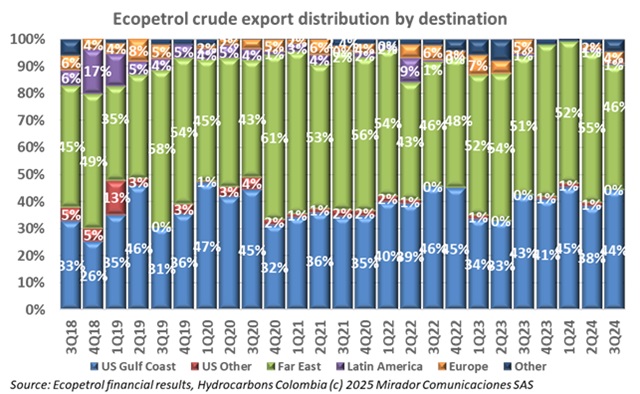During Colombia’s energy uncertainty, the ultra-deepwater Komodo-1 project emerged as a potential solution to expand the country’s oil and gas reserves. However, Ecopetrol (NYSE: EC) and Anadarko are increasingly pessimistic about the feasibility of exploration and production any time soon.
The National Hydrocarbons Agency (ANH) issued Resolution No. R4D1C4D0_1 of R4D1C4D0_2, establishing the international average price of Brent crude for 2024 and the table of monthly average price percentiles.
Frank Pearl, President of the Colombian Association of Oil and Gas (ACP), talked about the recent diplomatic crisis between the US and Colombia.
The Colombian government announced three new temporary taxes on petroleum, gas, and gambling exports as part of the measures introduced under the recently declared state of internal emergency. This decision raised concerns among economic sectors, particularly within the oil and gas industry, over its potential impact on investment and sector stability.
The National Hydrocarbons Agency (ANH) published a draft agreement entitled “Measures to promote compliance and normalization of current hydrocarbons contracts and agreements in the context of a Just Energy Transition.”
The Colombian Ministry of Finance (MinHacienda) issued a decree adding resources to the General System of Royalties (SGR) budget.
Venezuela’s oil production, which grew by 17.6% last year, faces a serious risk of decline if the new US administration under Donald Trump tightens sanctions on Caracas.
The Colombian government has announced new tax measures following the declaration of a state of internal disturbance.
The recent resignation of Colombia’s Transport Minister (MinTransporte), María Constanza García, reignited concerns among transport sector representatives, who claim that negotiations with the government, initiated after the 2024 national strike, have stalled.

In a dramatic escalation of diplomatic tensions over the weekend, US.President Donald Trump announced a series of retaliatory measures against Colombia in response to President Gustavo Petro’s refusal to accept deportation flights carrying Colombian migrants.